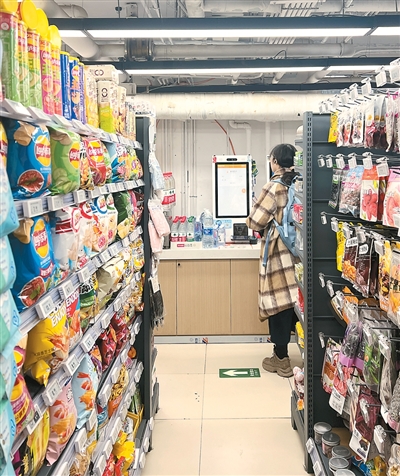




- BRNN
- BRI News
- BRNN News
- Database
Official Documents Polices and Regulations
Inter-government Documents International Cooperation BRI Countries
Business Guide Economic Data BRI Data
Trade
Investment Projects Latest projects
Cases - Content Pool

A shopper picks up items at an automated convenience store on the campus of a university in Beijing. (Photo/Zhu Yingxi)
Small commercial spaces such as unmanned convenience stores, self-service gyms, self-study rooms and self-service coffee shops are reshaping the consumer experience in China. Driven by technology and rising demand, they offer lower operating costs and greater convenience.
According to statistics, China's unmanned retail market is expected to surpass 50 billion yuan ($7.04 billion) in 2025.
Li Yawen, who runs an unmanned convenience store in south China's Guangdong Province, said such stores usually cover less than 10 square meters, with low rent, reduced labor costs and high efficiency.
Access control systems, cameras, and self-checkout machines make up the essential trio for these smart spaces. Behind the scenes, algorithms automatically adjust product displays and pricing to optimize management and efficiency.
According to Li, every purchase and every customer visit is tracked in real time on her computer. The artificial intelligence system analyzes shopper behavior and automatically suggests when and what to restock.
The same model has been adopted in other settings, such as unmanned self-study rooms and cafes.
At 10 p.m. on a weekday, a shared self-study room in Shanghai is still brightly lit. The system quietly logs the number of people entering and leaving and tracks their reserved time slots. After work, office worker Hu Xiaofan comes here to prepare for her postgraduate entrance exams.
"The self-study room is open 24 hours a day. It's great because I can spend my evenings productively," she said.
What makes unmanned stores appealing to business owners?
Li said their biggest advantages are flexibility and low operating costs. They can be set up in more locations — for example, in medium- or small-sized factories or office buildings with fewer than 300 or 400 people, where traditional convenience stores wouldn't be viable. An unmanned store needs only about 500 yuan in daily turnover to break even.
Pan Helin, a member of the Ministry of Industry and Information Technology's Expert Committee for Information and Communication Economy, said the rise of the unmanned economy stems from the deep integration of AI with consumption scenarios.
Its value, he noted, lies not only in reducing costs but also in offering consumers more diverse and personalized experiences. Looking ahead, Pan expects the unmanned economy to evolve into a hybrid model that combines human service with automation.

Tel:86-10-65363107, 86-10-65368220, 86-10-65363106